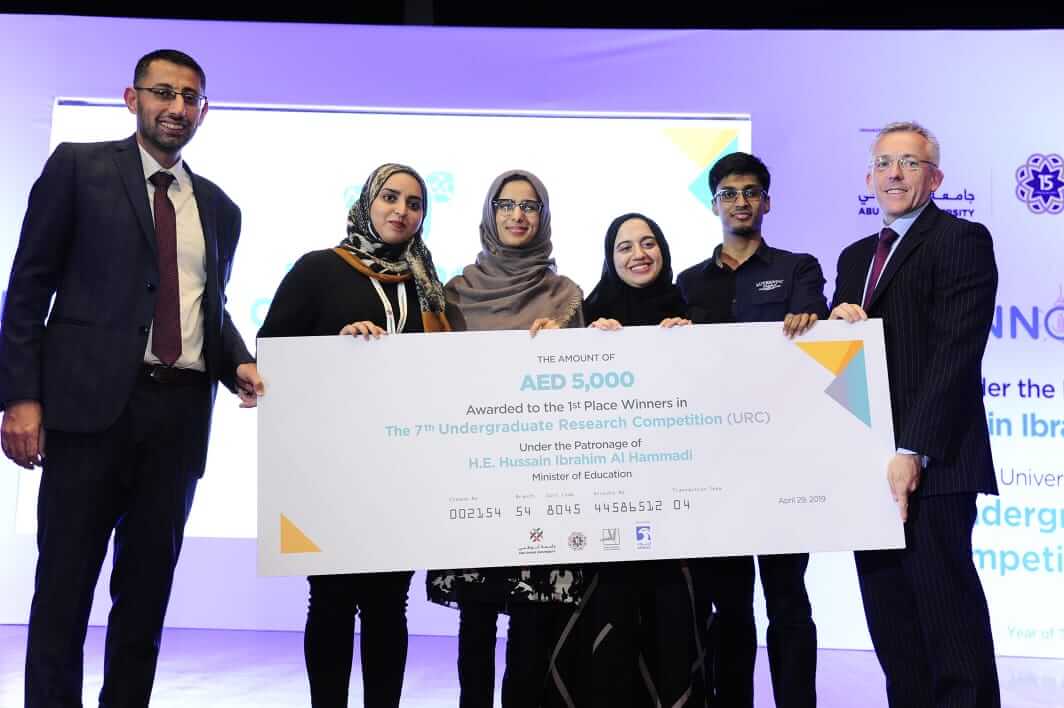
KU undergrad seniors win first, second and third place for innovative engineering projects at UAE’s premier national event for undergraduate research
Khalifa University students won first, second and third place at the 7th Undergraduate Research Competition (URC) hosted by Abu Dhabi University on 29 April, 2019, beating out over 260 teams that competed from 54 universities in the UAE, Saudi Arabia and Oman.
Senior students Noor Shahab Fikree, Wasiq Ahmed, Hiba Tariq, and Nida Rashid won first place in the Biomedical and Electrical Engineering Category for their Senior Design Project, ‘A Game-Based Exoskeleton Hand for Rehabilitation.’ The exoskeleton hand and game system provides engaging hand rehabilitation to individuals with diminished hand mobility and strength, such as stroke patients or people suffering from spinal cord injury.
The interactive game-based approach is intentionally designed to keep patients motivated so that they can be consistent in their rehabilitation training, which is key to regaining proper hand function.
The wearable exoskeleton employs a novel mechanism that allows for variable strength and mobility training. The interactive game aptly tracks the users’ capability to bend their fingers, simultaneously as the game is played, unlike clinical progress measurement techniques for rehabilitation. The system is also light weight and cheaper than existing systems on the market.
Another benefit to the system is that the user and his/her therapist can remotely access the patient’s progress over time. This implies that such a system has the potential to open the door for at-home therapy, which would further reduce cost and resources associated with traditional one-on-one therapy.
All three components – the exoskeleton, the game and the progress measurement – were developed by a multidisciplinary team of two mechanical engineering students, one electrical and electronics engineering student, and one computer engineering student, under the supervision of Dr. Shakti Singh, Assistant Professor of Electronic Engineering, and Dr. Dongming Gan, Assistant Professor of Robotics.
“As an interdisciplinary team, we learned a lot from each other. The nature of the project allowed each one of us to put our engineering knowledge to the test. We learned not only technical skills but also people skills through communication with advisors, suppliers, and each other. Undertaking this SDP, we learned how to learn, and we believe that it is the most important thing all of us can take away from this experience,” shared Fikree, Ahmed, Tariq and Rashid.
Another team earned second place in the Chemical and Environmental Engineering Category. Fatima Abdulla, Meera Alqemzi, and Alya Alzaabi won for their Chemical Engineering Design Project, ‘Development of Secondary Phase in Various Zeolites Framework.’
The project builds on the novel zeolite research work of Dr. Yasser AlWahedi, Assistant Professor of Chemical Engineering. Dr. AlWahedi discovered a new phase that can adsorb, or capture, two times as much hydrogen sulfide from natural gas compared to a typical zeolite, which is a special kind of mineral that can trap water and other molecules inside of it.
The team developed a low-cost adsorbent out of Dr. AlWahedi’s unique phase that can efficiently adsorb (capture) hydrogen sulfide from natural gas and desorb it (release from the adsorbent’s surface somewhere else). The eco-friendly adsorbent is an important step towards helping gas processing industries remove toxic levels of hydrogen sulfide from a natural gas stream more efficiently.
The yearlong project was quite a journey, all team members remarked. They gained valuable skills throughout the year, including problem and design analysis, experimentation, communication, leadership and project management skills.
“The feeling of achievement means everything to us, which words simply cannot describe. This project was very meaningful for us in both personal and professional levels. We were excited about the opportunity to expand our understanding and knowledge in applying all the engineering principles we have learned over the past three years with the hopes of having the slightest meaningful impact on our community,” Abdulla, Alqemzi and Alzaabi said.
A third KU team, seniors Suhaila Fareed Al-Ali and Omar Ali Alhammadi, took third place in the Mechanical Engineering Category for their project, ‘Dicycle Motor’ – a self-driving electric vehicle with two side-by-side parallel wheels.
Al-Ali and Alhammadi spent two years designing and fabricating the Dicycle Motor, valued at AED30,000, under the supervision of Dr. Bashar El-Khasawneh, Graduate Program Chair of the Department of Mechanical Engineering, and Dr. Federico Renda, Assistant Professor of Mechanical Engineering.
The Dicycle Motor is controlled remotely using a laptop. The operator sets the desired location using a program developed by the team, and the dicycle will take the rider there automatically.
Measuring 1.8 meters by 0.71 meters, the dicycle weighs around 250 kg and should be able to carry passengers of any size and weight. It can reach speeds around 40 km/h. Another unique feature of the dicycle is its ability to be easily customized to meet the rider’s needs.
Al-Ali and Alhammadi see many potential applications of the Dicycle Motor, such as in malls and for delivery services, allowing security guards and delivery personnel to drive through crowds of people and traffic more effectively. They also see potential military and search and rescue applications, explaining that the Dicycle Motor can be transformed into an unmanned drone and sent across far distances, even into hostile or hazardous environments.
Held annually under the patronage of H.E. Hussain Ibrahim Al Hammadi, Minister of Education, the URC is the premier national event that targets undergraduate students from across all universities in the UAE. It aims to encourage universities to promote scientific research among undergraduate students, while directly supporting the UAE government’s drive toward fostering innovation. This year, the competition extended participation to the entire GCC region.
Erica Solomon
Senior Editor
22 May 2019